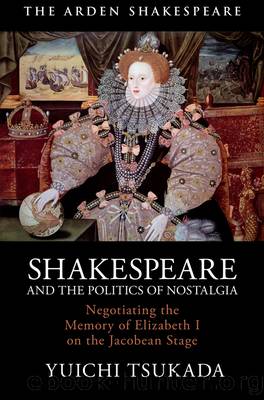Shakespeare and the Politics of Nostalgia by Yuichi Tsukada;

Author:Yuichi Tsukada;
Language: eng
Format: epub
Publisher: Bloomsbury UK
The warlike patron and her heroic soldier
Throughout the play, Coriolanus is compared to mythical heroes, to Hercules and to the war god Mars – the most revered war god in ancient Rome – from whom he takes his second name Martius.13 Coriolanus amply demonstrates his martial excellence in his conquest of Corioles, a victory from which he earns his surname; when he triumphantly returns to Rome, he is hailed as a demigod and the nobles bend their knees ‘as to Jove’s statue’ (2.1.260). When he joins the Volscians, Rome’s militant rival tribe, after his banishment from Rome, the Volscian senators ‘stand bald before him’ (4.5.197) and deify him ‘as if he were son and heir to Mars’ (4.5.194–95). Their soldiers idolize Coriolanus, substituting his name for that of their god in their prayers (‘Your soldiers use him as the grace fore meat, / Their talk at table and their thanks at end’ [4.7.3–4]), and Cominius also reports that Coriolanus ‘is their god. He leads them like a thing / Made by some other deity than nature / That shapes man better’ (4.6.91–93). As Menenius puts it, Coriolanus ‘wants nothing of a god but eternity and a heaven to throne in’ (5.4.23–24).
Shakespeare’s representation of Coriolanus as a war god has an important Jacobean significance. As will be discussed later in this chapter, the deification of Coriolanus, for example, echoes the glorification of Essex, who was similarly praised for his warlike spirit and hailed as ‘braue Mars of men’ in Jacobean discourse.14 Shakespeare’s representation of the heroic conqueror is not only comparable to the way in which Essex was commemorated at this time but also to the representation of Prince Henry, as he was also frequently compared to a war god.15 For the celebration of Prince Henry’s investiture in 1610, for example, Ben Jonson composed Prince Henry’s Barriers, in which the Lady of the Lake praises Prince Henry as Mars (‘Does he not sit like Mars, or one that had / The better of him, in his armour clad?’), aligning Prince Henry with Elizabethan militant heroes.16 Thus, in the local contexts of 1608–9, Coriolanus can be linked to the glorification of heroic militarism in Jacobean England.
The Jacobean significance of Shakespeare’s representation of Volumnia, on the other hand, has not attracted much critical attention, despite the fact that Shakespeare invested great interest in developing her character. Both in Plutarch’s Lives and Livy’s The Romane Historie (translated by Philemon Holland and published in 1600) – Shakespeare’s historical sources – Volumnia features only towards the ends of their accounts: that is, when she is sent to persuade Coriolanus not to attack Rome.17 By contrast, Shakespeare gives his Volumnia a prominent role from the start of the play, representing her as a belligerent, domineering mother who sends her son to the battlefield without hesitation and rejoices when he comes home wounded. Shakespeare’s Volumnia proudly announces that it is her encouragement which has made Coriolanus a successful soldier and that she is the source of his valour: ‘Thy valiantness was mine, thou suck’st it from me’ (3.
Download
This site does not store any files on its server. We only index and link to content provided by other sites. Please contact the content providers to delete copyright contents if any and email us, we'll remove relevant links or contents immediately.
Still Me by Jojo Moyes(10791)
On the Yard (New York Review Books Classics) by Braly Malcolm(5395)
Eleanor Oliphant Is Completely Fine by Gail Honeyman(5086)
A Year in the Merde by Stephen Clarke(5080)
The Bookshop by Penelope Fitzgerald(3621)
Surprise Me by Kinsella Sophie(2994)
How Music Works by David Byrne(2965)
Pharaoh by Wilbur Smith(2882)
Why I Write by George Orwell(2776)
A Column of Fire by Ken Follett(2493)
The Beach by Alex Garland(2431)
The Songlines by Bruce Chatwin(2414)
Churchill by Paul Johnson(2368)
Aubrey–Maturin 02 - [1803-04] - Post Captain by Patrick O'Brian(2214)
Heartless by Mary Balogh(2172)
Elizabeth by Philippa Jones(2078)
Hitler by Ian Kershaw(2048)
Harry Potter and the Cursed Child by J. K. Rowling & John Tiffany & Jack Thorne(1975)
The Patrick Melrose Novels by Edward St. Aubyn(1910)
